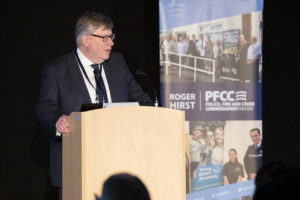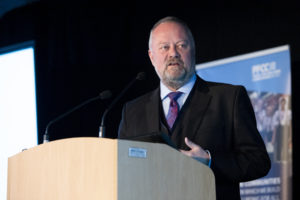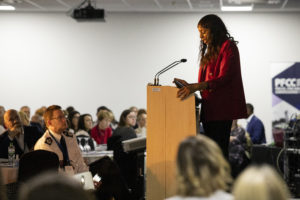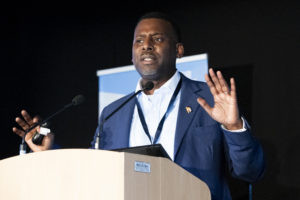Perspectives on violence event raised awareness of Essex’s violence and vulnerability challenges
A knife crime victim, a woman groomed as part of county lines, a child abuse victim and murder victim Stephen Lawrence’s brother were just some of the speakers at a recent event designed to help partners fight violent crime in the county.
 The Police, Fire and Crime Commissioner for Essex (PFCC) and the Essex Violence & Vulnerability Unit brought together people from all agencies to share ideas and best practise on tackling gangs, drugs and county lines in the county.
The Police, Fire and Crime Commissioner for Essex (PFCC) and the Essex Violence & Vulnerability Unit brought together people from all agencies to share ideas and best practise on tackling gangs, drugs and county lines in the county.
During the Perspectives on Violence Conference, a range of powerful voices were heard on stage, many telling their own personal stories and using them to fight for good in the county.
Under the hashtag #UnstoppableEssex, partners from Essex Police, the probation service, local councils, education, health, organisations and charities operating in and around the county shared ideas and success stories in the mission to tackle violent crime and protect the vulnerable.
Speaking at the event Roger Hirst, the Police, Fire and Crime Commissioner for Essex, said: “This is such an important topic for us. It’s an area we have to make a difference in; to make a difference to these young people’s lives and those at risk and to make them safe.”

Roger Hirst addresses the Conference © Clarissa Debenham Photography. www.clarissadebenhamphotography.co.uk @clarissadebenhamphotography
Rapper and spoken word artist Quinton Green – who uses music to reach disaffected youngsters and inspire them to express themselves through music and poetry- opened the event with a performance of his work.
Joanne Bakare © Clarissa Debenham Photography. www.clarissadebenhamphotography.co.uk @clarissadebenhamphotography
Joanne Bakare is a custody suite case worker for St Giles Trust, offering support to young people in custody.
At the age of 15, she was groomed by an older man in a county lines case. She was trafficked from her children’s home in Peckham to a drug den in the countryside where she was forced to live in squalor and deal drugs. By the age of 17, she was pregnant and in prison.
Fifteen years later, she uses her real-life experience to reach vulnerable young people.
She told delegates: “When I was 15, I caught the attention of a drug dealer in his late 20s. He was the kind of guy all the boys wanted to be and all the girls wanted to be with. He showered me with attention; he gave me confidence about all the things I didn’t like about myself,. He lavished me with expensive gifts and took me to the latest nightclubs.
“I was a young girl in love and would have done anything he asked of me. He was essentially grooming me.”
Having stepped on a dirty needle in the drug den, Joanne escaped and was taken from the roadside to the local police station. She fell back into a life of crime and was jailed for robbery at the age of 17.
She said: “I finished my sentence and was reunited with my son. Luckily, I met my now manager from St Giles Trust.
“A lot of the kids we are seeing are coming to us from violence and county lines. A lot of us within the Trust are people who have lived that life, so they can relate and open up to us.”
In Glasgow, a 250-year history of gang violence has centred around territory.
Former police officer Dr William Graham told the conference how during his service, street fights were an everyday occurrence.

Dr William Graham © Clarissa Debenham Photography. www.clarissadebenhamphotography.co.uk @clarissadebenhamphotography
He said: “When I was a sergeant, my team were constantly chasing gangs of young people running around with knives, sticks, whatever they could get their hands on, like a pack of wild animals. If there was a day where there hadn’t been a gang fight, we were asking why as it was so rare. We got to the point where we realised we could not do it on our own and so the Violence Reduction Unit was formed in 2005.”
After officers visited America and saw examples of alternative policing of similar issues, Dr William – then an inspector – was brought in to manage the multi-agency team consisting of police, health, social work, education and youth workers.
He said: “We were all working together to reduce violence in Glasgow.”
In three years, 400 people attended a self-referral court session and signed a pledge to stop the violence. They were introduced to education, health and employment support.
Now a lecturer in criminology specialising in policing and criminal justice studies, Dr William said: “It was about identifying why they were involved in the gangs and violence to start with.
“We showed extremely graphic photos of what happens when someone is slashed in the face. They don’t hang around to see the impact of their actions, so we showed them. We used as many tools as possible.
“The difference was quite incredible.”
The project saw a 50 per cent drop in violent crime committed by those involved with the project, with a reduction in murder, antisocial behaviour and gang fights.
Dr William is now a consultant working for Northamptonshire Police, supporting the creation of the Northampton Community Initiative to Reduce Violence (CIRV).
The Finding Rhythms project is encouraging prisoners in HMP Chelmsford to use music to help them to break the cycle of reoffending.
Kirsty Gibbons, senior probation officer, told delegates about the project and shared some of the spoken word and music produced by those on the course.
“I am here to talk about prevention, so we can teach in primary school what we do not want to be teaching in prison.”
Former television news reporter, Sharon Doughty, founder of the DotCom Learning Programme, told delegates how her safeguarding project is giving children the words and the opportunity to tell someone they are frightened or worried.
Sharon also witnessed “extreme violence” between the ages of three and seven.
Sharon said: “I was fed, well dressed, picked up on time and had no way of telling anyone what was happening to me.
“I can help children because of my experience.”
Rt Hon Stuart Lawrence © Clarissa Debenham Photography. www.clarissadebenhamphotography.co.uk @clarissadebenhamphotography
Teenager Stephen Lawrence was murdered in a racially motivated attack in London in 1993.
His family have tirelessly campaigned ever since to bring about change through the Stephen Lawrence Charitable Trust and Stephen Lawrence Day.
The Rt Hon Stuart Lawrence, Stephen’s brother, attended the conference and said: “I have had permission since Stephen died to be angry, to be dysfunctional. I have reason to be that person.
“But, my mum told me to treat other people how you want to be treated. So, as I have gone through my life, I have realised that it starts with me; with how I portray myself, how I carry myself and how I act.”
Stuart, a secondary school teacher, told how his brother was portrayed as a gang member and a drug dealer who “got what he deserved”. He said change only came when Nelson Mandela met with the family and compared the killing with South Africa “where black lives are cheap”.
Stuart said: “We were seen as villains; as the bad people. For us, that was so, so hard.
“I look to my own mum and dad and ask ‘how did you do it, how did you not just give up’. It’s about the resolve of my parents; believing if you do the right thing, only good things can happen.” Stuart asked delegates to challenge themselves and their perspectives on individuals and situations. He went on to urge people to carry out acts of kindness to those around them, to open doors, to say hello to someone you do not know or buy someone’s coffee.”
Roger Hirst added: “Only by working together can we tackle the devastating effects of gangs and county lines in our communities. We are already making significant progress, but the aim of this conference was to bring together and showcase the fantastic work already being done across the country. We can achieve a lot together and we can make safer, secure communities for all.”











